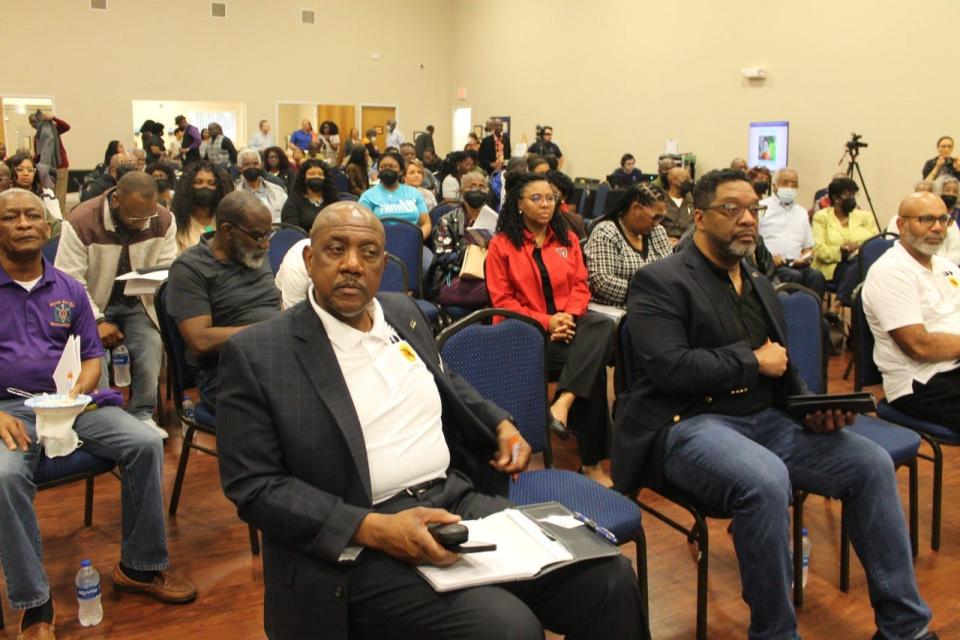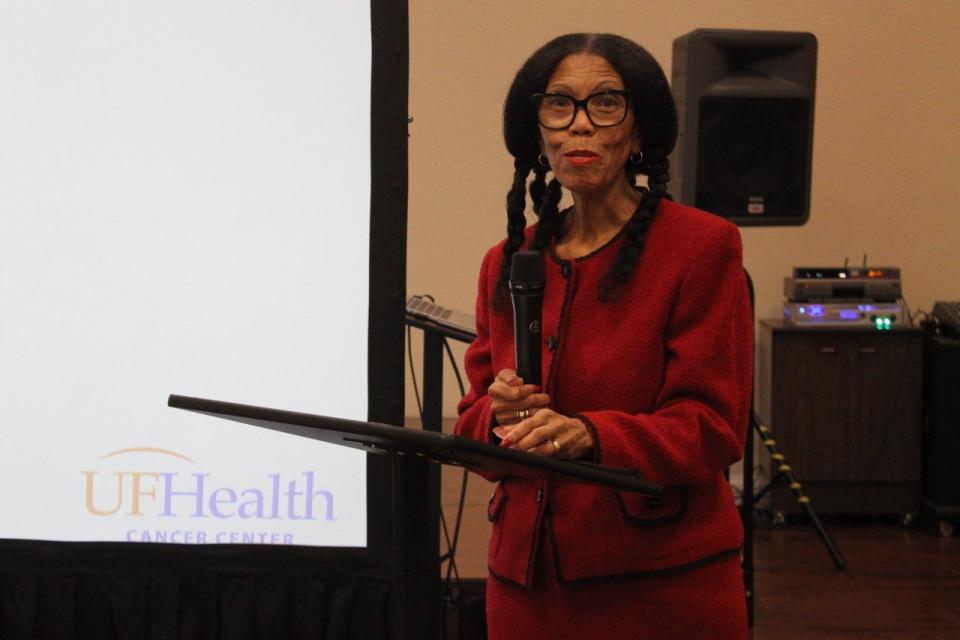Prostate cancer awareness event draws several hundred from the community
Over 200 people gathered to learn more about prostate cancer, ways to reduce the risk of diagnosis and how to cope with it at an event targeting Black men and their loved ones.
Held Saturday at Springhill Baptist Church in SE Gainesville, the event was sponsored by the University of Florida’s Health Cancer Center’s Community-Partnered Cancer Disparities Research Collaborative (CDRC) and the Office of Community Outreach and Engagement and the UF Department of Urology, it was billed as "A Power Over Prostate Cancer Gathering for Black Men and the Family Members Who Love Them."
The CDRC consists of eight local Black churches, community scientists, technology coordinators and a group of faculty members and administrators from the UF Health Cancer Center who partner to help prevent and reduce cancers among Black people living in or near East Gainesville.
Health education:Health fair educates men on prostate cancer
Prostate cancer:Reducing prostate cancer among Black men to be discussed at SE Gainesville church on Feb. 11
Prostate study:Inner-city blacks more at risk for prostate cancer
The churches involved in the collaboration are Springhill, DaySpring and Faith Baptist churches, Greater Bethel AME Church, Williams Temple Church of God in Christ, PASSAGE Family Church, Showers of Blessings Harvest Center and Upper Room Ministries.
The event was co-chaired by Pastor Adrian Taylor of Springhill and Ron Rawls of Greater Bethel.
Attendees learned about new prostate cancer treatments and prevention, talked with survivors and oncologists, learned how to cope with prostate cancer through group discussions and learned about cancer research study opportunities that can benefit Black men and women.
One of the keynote speakers was Dr. Thomas Stringer, associate chair and associate professor in the UF Department of Urology, who spoke about prostate cancer prevention.
More and improved outreach programs are needed to educate men in inner-cities about prostate cancer to reduce the mortality rate of Black men who are diagnosed with the ailment. Those programs should include providing free screenings, building relationships with primary care physicians, addressing low health literacy, developing ways to address financial impact of care and recruit participation of Black men in clinical trials, Stringer said.
Lifestyle and diet changes that include eating a more low fat diet with more fruits and vegetables, drinking green tea and avoiding charred meat, smoking and drinking less, increasing intake of vitamin D and staying sexually active, are all things that can reduce the risk of being diagnosed with prostate cancer, Stringer said..
Prostate cancer accounts for 14% of all new cancer cases in the U.S. and 5.7% of all cancer deaths, Stringer said.
According to the Surveillance, Epidemiology and End Results Program (SEER) data, non-hispanic Black men are 1.7 times more likely to develop prostate cancer than non-hispanic white men and 2.1 times more likely to die of prostate cancer than non-hispanic white men.
Stringer said screening is important to reduce the risk of advanced and deadly disease.
According to Stringer, screening challenges consist of lack of health literacy, insurance issues, possible language barriers and medical distrust.
Stringer said 39% of eligible men participate in prostate cancer screening.
Stringer said men should get an annual PSA and digital exam. PSA stands for prostate specific antigen and it is a blood test used primarily to screen for prostate cancer.

A digital exam is an examination in which a doctor inserts a lubricated gloved finger into the rectum to feel for abnormalities.
Another keynote speaker was Dr. William Mendenhall, a professor in the department of radiation oncology in UF’s College of Medicine.
Mendenhall’s presentation was about new treatments for prostate cancer.
According to Mendenhall, the treatment options for prostate cancer are surgery, which is also known as prostatectomy; radio therapy; HIFU, which stands for high intensity focused ultrasound and cryotherapy, which is a procedure to freeze prostate tissue and kill cancer cells.
“Not doing them (screenings) is like turning off a fire alarm,” Mendenhall said.
There were five group discussions—one for women and four for men to discuss prostate cancer amongst themselves.
The women's group discussion was led by the Rev. Dr. Marie Herring, Dr. Lakeshia Cousin, Dr. Staja Booker, Dr. Luisel Ricks-Santi, and Dr. Carolyn Tucker.

Tucker is the director of the UF Cancer Center’s CDRC, a UF Florida Blue Endowed Chair in Health Disparities Research and a research professor in psychology.
“When someone has a significant disease, sometimes the caretaker is impacted even more because of exhaustion,” Tucker said. “Ask family members and your pastor for help to find people who are willing to volunteer their time. Understand you are worthy of help. If you get worn out, you will not be helpful to anybody.”
The event also included a discussion with 11 panelists, including prostate cancer survivors, urology physicians and others.
Joseph Johnson, a prostate cancer survivor, said it is important people know their family’s history of diseases.
“My grandfather and my great grandfather were diagnosed with prostate cancer,” Johnson said. “We need to share with everyone about the past diseases in the family because it is possible that you might have the gene.”
Johnson encouraged the men in the audience to partake in screenings to let their primary care physician know what treatments they need early on if they are diagnosed.
“Set your pride aside and get checked,” Johnson said.
Dr. Eric Cooks, a communication scientist who researches culturally appropriate cancer prevention data and addresses cancer health disparities, talked about the importance of participating in cancer research.
For more information about the UF Health Cancer Center, call 352-306-3133.
This article originally appeared on The Gainesville Sun: Prostate Cancer event draws 200 Black men and their loved ones

